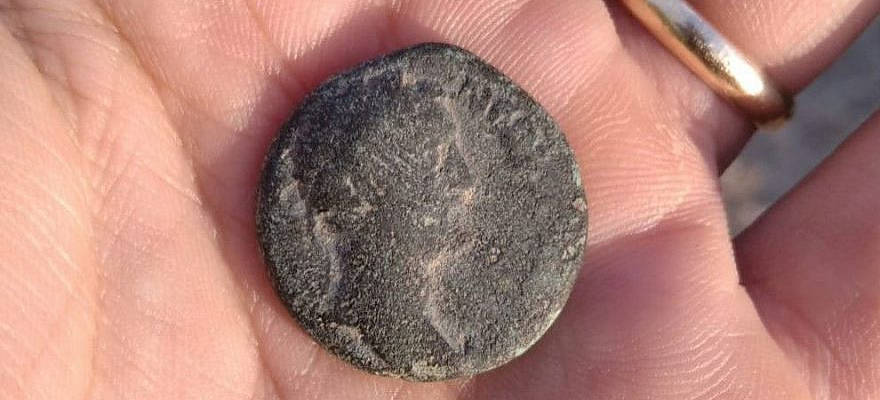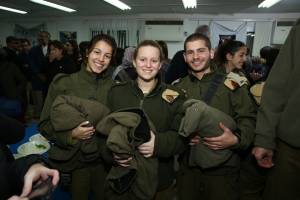Ido Gardi “demonstrated exemplary civic behavior and we hope that he will act as an example for others who discover ancient finds.”
By TPS
IDF soldier Ido Gardi was on a training exercise on the slopes of Mount Carmel in northern Israel when he noticed something different on the ground. It was an ancient and rare coin, bearing the head of the Roman emperor Antonius Pius and dating from 158–159 CE.
Very few coins of this kind from recorded contexts have been found in Israel.
Dr. Donald Tzvi Ariel, head of the Israel Antiquities Authority’s (IAA) Numismatics Department, noted that “this coin joins only 11 such coins from known locations in the National Treasures Department collection. All the coins were found in northern Israel, from Megiddo and Zippori to Tiberias and Arbel.”
On its obverse, the coin bears the head of the Roman emperor Antoninus Pius, who ruled in 138–161 CE, and the reverse shows the Syrian god MEN (the moon god) with the legend “of the people of Geva Phillipi”, [civic] year 217 (158–159 CE).
Dr. Avner Ecker, lecturer in classical archaeology at Bar-Ilan University’s Department of Land of Israel Studies and Archaeology, explained that the coin is one of the municipal coins minted in the city of Geva Philippi, also known as Geva Parashim (City of Horsemen).
In the Roman period, cities, known as poleis, were granted the right to mint their own coins. The year marked on the coin is the year when the municipal council was established and its citizens were allowed self-government under the Roman Empire.
Geva is an ancient settlement, referred to by Josephus as a town located on the foothills at the edge of the Jezreel Valley. Herod settled his cavalry forces there, hence the name City of Horsemen. In the Great Revolt, in 66–70 CE, local and Roman forces set out from there to fight Jewish rebels near Bet She‘arim.
Excavations conducted by Bar Ilan University at the site last summer unearthed remains of fortifications and buildings dating from the Hellenistic to the Byzantine period.
Nir Distelfeld, an inspector for the IAA Northern District’s robbery prevention unit, estimated that the coin was probably lost by its owner on one of the roads that cross this area until the IDF soldier spotted it almost 2,000 years later.
“This is an opportunity to call on any members of the public who have found coins, or any other ancient artifacts, to report them to the Israel Antiquities Authority,” he said.
He stressed that antiquities are national treasures, it is forbidden to actively seek them, and any chance finds must be reported to the authority.
Gardi “demonstrated exemplary civic behavior and we hope that he will act as an example for others who discover ancient finds,” said Distelfeld.
Gardi was awarded a certificate of appreciation for good citizenship.
Bring Joy to Israeli Soldiers - Send Winter Care Packages!
We are honored to thank the young men and women of the IDF who risk their lives every day to defend the citizens of Israel.
Join us in sending winter care packages and personal notes of support to Israeli soldiers who are out in the cold all day.
Warm up a soldier's heart with essential winter wear including fleece jackets, hats, gloves and more. Keep an entire unit warm!
THE SOLDIERS REALLY APPRECIATE YOUR LOVE AND CONCERN!
Click Here to Send Your Gift and Personal Note to Israeli Soldiers

